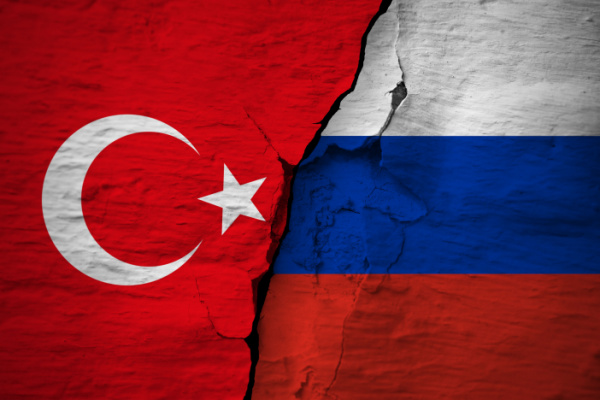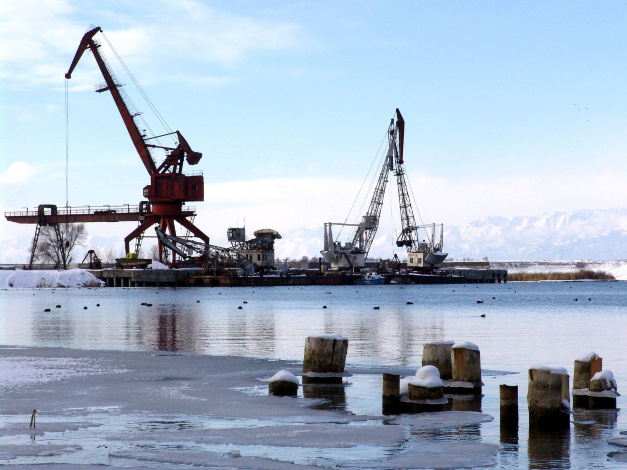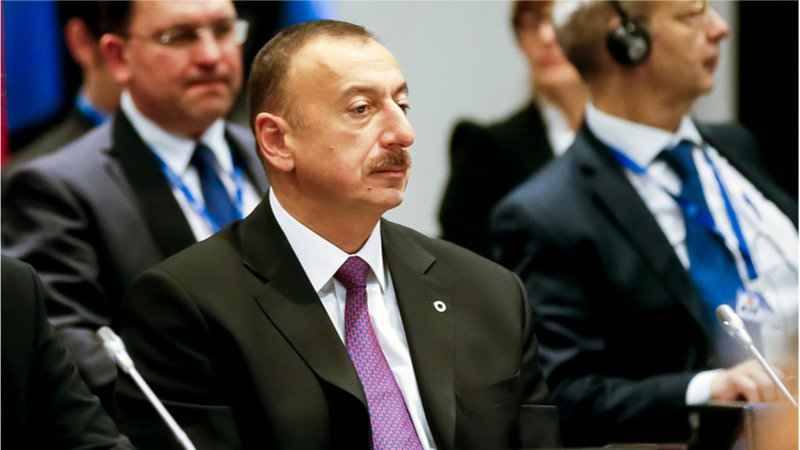Russia Reengages with Armenia (and Azerbaijan)
By Eduard Abrahamyan
In recent months, Armenia and Russia have strengthened their relations. A series of high-level meetings shows not just a return to normal diplomacy but a purposeful reshaping of their alliance. Alongside President Putin’s renewed ties with Azerbaijani President Aliyev and the Kremlin’s broader adjustment of its regional strategy, the revived dialogue between Putin and Prime Minister Pashinyan forms part of a wider diplomatic renewal. This shift marks a clear easing of the tensions that strained their bilateral relations from September 2022 to mid-2024.
Credit: Wikimedia Commons
BACKGROUND: The intensified Armenia–Russia bilateral reengagement commenced on October 8, 2024, with the Moscow meeting between Putin and Pashinyan, ostensibly ending a two-year estrangement stemming from Moscow’s inaction and the CSTO’s reluctance to deter or even explicitly identify Azerbaijan as the initiator of the September 2022 incursions into Armenian territory. Equally detrimental was the perception that Moscow had tacitly approved Azerbaijan’s September 2023 military operation in Karabakh.
The October 2024 meeting set both sides on a path toward a “new rhythm” in strategic relations, creating the basis for a renewed partnership aimed at resolving the “misunderstandings” that had emerged, as later described by Foreign Ministers Ararat Mirzoyan and Sergey Lavrov. The two leaders have since maintained regular contact through phone calls and in-person meetings throughout 2025. Yerevan also hosted several high-level Russian delegations, underscoring the breadth and institutional depth of the renewed dialogue. Diplomatic sources described this reset as a key turning point that effectively ended the period of tension, with both governments instructing their institutions to pursue a full realignment across all areas of strategic cooperation.
In January and May 2025, the foreign ministers made reciprocal visits, each reaffirming the start of a “new page” in the strategic partnership through “genuine and open discussions on accumulated issues.” This diplomatic thaw reached its peak in June 2025 with the visit of Valentina Matviyenko, Chairwoman of Russia’s Federation Council, to Yerevan, aimed at strengthening parliamentary cooperation. Matviyenko’s visit not only supported Armenia’s evolving foreign policy direction but also highlighted the Kremlin’s engagement in Armenia’s domestic politics. Her meetings in Yerevan were widely seen as a sign of Moscow’s friendly neutrality, or even quiet support for the ruling Civil Contract party ahead of Armenia’s general elections planned for June 2026. After her meeting with Prime Minister Pashinyan on 6 June, Matviyenko stated that “[Pashinyan] conveyed greetings to our president and emphasized that, despite insinuations, he and [Putin] have always maintained constructive, substantive relations without any issues,” sending a clear message to the “ill-wishers” that no divisions exist between the Armenian and Russian leadership.
The revival of high-level diplomacy has taken place alongside Pashinyan’s participation in international forums led or co-funded by Russia. In May 2025, he attended Moscow’s Victory Day parade, one of Putin’s most visible displays of state power and ideological authority. Pashinyan also traveled to Kazan to join the sixteenth BRICS Summit, which the Kremlin presented as proof that Western efforts to isolate Russia had failed. In July, Armenia’s Prime Minister took part in the International Conference on Nature and Environmental Protection in the Altai, supporting Putin’s broader vision of portraying Russia not as a marginal actor in the Turkic world but as the guardian of its historical and cultural origins amid the growth of the Organization of Turkic States. Later, Pashinyan attended the Shanghai Cooperation Organization (SCO) summit, where Pakistan blocked Armenia’s application for full membership. Armenia would otherwise likely have joined one of the most rapidly consolidating non-Western frameworks, arguably challenging the West.
The recent strengthening of Armenia–Russia relations is closely linked to economic interdependence and the gradual improvement of Russia’s public image in Armenia. Economically, Russia has reaffirmed its role as Armenia’s main trading partner, with trade turnover reaching a record US$ 12.4 billion in 2024, more than twice the level recorded in 2022. According to investigative reports, this increase reflects the function of both Armenia and Azerbaijan as logistical intermediaries in Moscow’s sanction-evasion networks. Armenia’s re-export channels have supported the transfer of dual-use goods to, and embargoed gold from, Russia, while Azerbaijan has discreetly facilitated the re-export of Russian hydrocarbons. Together, these practices have formed a coordinated and mutually beneficial regional mechanism that reinforces the Kremlin’s economic resilience. In September 2025, during the World Atomic Week conference in Moscow, Pashinyan and Putin agreed that Rosatom would extend the operation of the Metsamor Nuclear Power Plant for another decade, ensuring continued supply of over 30 percent of Armenia’s electricity. Official statements also noted that the two leaders discussed the potential construction of a new reactor by Rosatom to address Armenia’s concerns about the ageing Soviet-era facility.
Russia’s public image in Armenia has begun to recover from its low point in 2022–2023. A July 2025 poll by the International Republican Institute shows a clear improvement in public attitudes: the share of respondents viewing Russia as the “greatest threat” fell to 27 percent (down from 40 percent the previous year), while 45 percent now regard Russia as Armenia’s most important political partner, an 18-point increase since 2024. This change in perception is driven less by traditional Russian information campaigns or local pro-Russian media than by a deliberate adjustment of Armenia’s state-controlled narrative, which now tends to present Russia in a “pragmatically” neutral light. The outcome is a gradual restoration of public ambivalence, a sentiment neither strongly pro- nor anti-Russian, that mirrors Yerevan’s cautious process of re-accommodation with Moscow.
IMPLICATIONS: The ongoing renegotiation of the Russia–Armenia alliance, alongside Putin’s renewed rapprochement with Azerbaijan as shown at the CIS Dushanbe summit in October, suggests that the recurring “crises” in Moscow’s relations with Yerevan and Baku are not genuine strategic breaks. Instead of marking major shifts, these episodes usually reflect short-term tactical frictions, temporary disagreements that each side manages or uses to achieve immediate political or diplomatic goals.
Such frictions are often exaggerated in Western discussions as signs of a major geopolitical shift, whether portrayed as Armenia’s “pro-Western pivot” or Azerbaijan’s alleged “anti-Russian turn.” In reality, the situation is more nuanced. Both Yerevan and Baku often highlight the appearance of tension with Moscow for strategic purposes, using the perceived distance from Russia to strengthen their negotiating position with Western partners.
For Armenia, this approach supports a dual narrative: expressing European ambitions to gain sympathy and investment while keeping practical ties with Russia for various reasons. Pashinyan’s shifting engagement with the CSTO reflects this duality—not an actual withdrawal, but an effort to push the bloc to act while maintaining reassurance toward Western partners. Likewise, the 2024 removal of Russian border guards from the Armenia–Iran border was largely symbolic, affecting only the Agarak–Nordooz checkpoint, while Russian software systems and personnel continued to operate.
Azerbaijan follows a similar strategy, occasionally dramatizing its disagreements with Moscow to project strategic independence while maintaining practical cooperation. As Aliyev stated during his meeting with Putin in Dushanbe, despite the December plane incident, the “relationship has successfully developed across many areas,” which Putin hoped would “continue in the spirit of our alliance.” Despite symbolic disputes, Baku and Moscow continue to collaborate in energy, transport, and security, including through the “3+3” regional platform and trilateral projects involving Russia, Turkey, Azerbaijan, and Iran. These selective displays do not mean that all tensions are artificial or coordinated. Real disagreements remain, such as over Moscow’s security obligations to Armenia or the oil contamination scandal involving Russian exports passing through Azerbaijani infrastructure to the EU, but Pashinyan and Aliyev rarely cross Moscow’s strategic boundaries. Thus, what appears as instability often serves to renegotiate hierarchies rather than to overturn them.
For Moscow, this managed ambiguity remains advantageous. By allowing limited dissent and some visible distance, Russia maintains its regional influence while appearing less intrusive, “being present by seeming absent.” This recently adopted strategy enables Putin to exercise influence without attracting too much Western attention. From Moscow’s viewpoint, even Western-backed initiatives such as the August 8 Armenia–Azerbaijan Trump Route for International Peace and Prosperity (TRIPP) infrastructure deal are not viewed as threatening. Instead, TRIPP is seen as fitting into Russia’s wider connectivity strategy, linking Russia and Turkey through Azerbaijan, similar to how the North–South corridor connects Russia and Iran. The Kremlin’s reasoning assumes that regional realities, codified by the November 9, 2020, trilateral agreement, will eventually force Washington either to cooperate with Moscow or to withdraw from the project.
For Yerevan, adopting a “region-first” policy means engaging with Russia, Azerbaijan, Turkey, and Iran, even while maintaining pro-Western rhetoric. The March 2025 parliamentary resolution to start EU membership talks serves mostly performative and domestic aims rather than indicating a real policy shift. The Pashinyan government continues to emphasize the advantages of the Eurasian Economic Union and has applied to join the SCO, showing how Western-oriented language coexists with lasting non-Western partnerships.
Moscow’s acceptance of this balancing comes from its belief that Pashinyan’s EU-focused gestures do not present a real threat. This explains the Kremlin’s restrained reaction to events such as the arrest of Russian-Armenian businessman Samvel Karapetyan, who has fallen out of favor in Putin’s circles. Putin does not oppose either Pashinyan or Aliyev; rather, he views both as cooperative actors within Russia’s changing regional strategy. This approach is reflected in the Kremlin’s “warm neutrality,” expressed by Matviyenko toward Pashinyan before Armenia’s elections, and in Putin’s calculated revelation at the Dushanbe summit about Ramiz Mehtiyev’s planned coup against Aliyev.
CONCLUSIONS: At this stage, Armenia–Russia relations highlight the growing gap between outward perception and internal reality in the region. To Western observers, Armenia’s pursuit of European integration and broader multilateral ties may seem like a gradual move away from Moscow’s sphere of influence. Yet beneath this surface lies a more complex and regionally rooted dynamic. It suggests that the Kremlin is rethinking its approach in the South Caucasus, developing a coordinated and flexible form of engagement with both Armenia and Azerbaijan that hides the full extent of Russian influence while strengthening the illusion that Russia is withdrawing. This adjustment gives all three actors subtle room to maneuver, allowing for a shared strategy of cooperative dominance and geopolitical maskirovka.
AUTHOR’S BIO: Dr Eduard Abrahamyan is a Senior Research Fellow at the Institute for Security Analysis and author of Small States, Russia and the West: Polarity, Constellations and Heterogeneity in the Geopolitics of the Caucasus (Routledge, 2025).
Is This Turkey’s Hour in Central Asia?
By Stephen Blank
February 9, 2024
Virtually every assessment of trends in Central Asia since Putin’s full-scale invasion of Ukraine in 2022 and many preceding analyses have postulated a decline in most if not all dimensions of Russian influence and capacity. To be sure, Russia’s imperial aspirations and ability to indulge in them remain central to Russian policy. Nevertheless, that capacity and ability to give this area the attention it merits has visibly declined, not least regarding defense policy. That decline has opened and continues to create opportunities for other interested parties to raise their regional profile, including China, Turkey, India, the EU, and the U.S.

Kadyrov in the Shadow of Prigozhin’s Death
By Alexander Yeo and Dr. Emil A. Souleimanov
October 26, 2023
The demise of Yevgeny Prigozhin, the head of the Wagner Group, in August marks a time of change for the Russian elite. Chechnya’s strongman Ramzan Kadyrov is one of the members of the elite most likely to take advantage of the situation to strengthen his own position. In contrast to Prigozhin’s unpredictability, Kadyrov represents a controllable alternative for Putin given his utter reliance on the Russian President, and thus will be able to provide loyalty and stability through his own private security apparatus. The utilization of this apparatus, however, presents risks for Kadyrov. Therefore, Kadyrov is likely to look to improve his internal political position within Russia in the coming months.

Russia-Kazakhstan dynamic in the context of European energy and economic security
By Mamuka Tsereteli
August 11, 2022
Kazakhstan, and Central Asia in general, needs a long-term energy and commodity export strategy. Economic and energy security for the landlocked countries requires diversification of the transportation options for export and import. Europe will need every extra barrel of oil it can get, and Kazakhstan needs reliable markets, so uninterrupted access to resources and markets through trusted connectivity with the likeminded countries should always be the priority in all times, good and bad.

Azerbaijan and Russia's Invasion of Ukraine
By Natalia Konarzewska
April 6, 2022
Like several other countries, Azerbaijan seeks to retain functioning relations with both Russia and Ukraine amid Russia’s invasion. Baku provides Ukraine with humanitarian aid yet avoids actions directly opposing Moscow for fear of retaliation. Baku’s position reflects its interest in maintaining Russia’s acceptance of Azerbaijan’s multi-vector foreign policy and in gaining Moscow’s support for its objectives in Nagorno-Karabakh. Moreover, the recent surge of violence in Nagorno-Karabakh suggests that Baku is taking advantage of the opportunity arising as Western and Russian attention is directed elsewhere to improve its own position vis-à-vis the separatist region.




